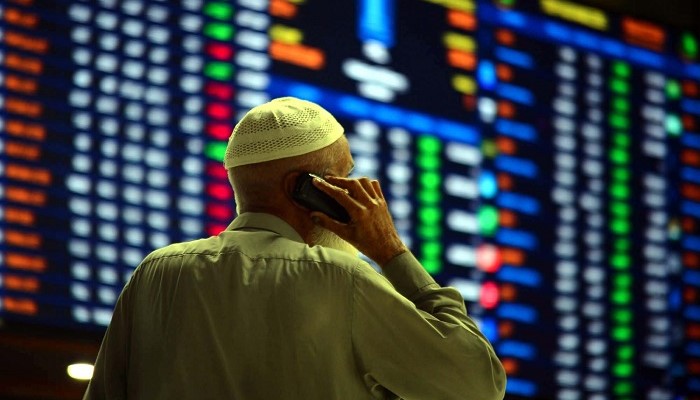
- Macroeconomic fundamentals fail to compensate for political nervousness.
- The PTI protests and unrest are weighing heavily on investor confidence.
- The KSE-100 index fell 3,899.19 points at the session low.
On Tuesday, stocks experienced a stormy session, marked by wild swings on both sides, against a backdrop of intensifying political conflicts, with the fundamentals-driven recovery running out of steam and the indexes seesawing, as investors Panicked people remained on the fence, waiting for the uncertainty to dissipate.
At the close, the Pakistan Stock Exchange (PSX) stock benchmark KSE-100 index fell to 94,574.16, down 3,505.62 points, or -3.57 percent, from the previous close, marking its worst single-day decline.
On the other hand, the overall trading volume was recorded at 1.11 billion shares, with 355 listed companies across sectors recording losses.
The peak index fluctuated in a wide range, recording a high of 99,819.59 and a low of 94,180.59, reflecting the cautious stance of market participants.
The current political unrest, fueled by the Pakistan Tehreek-e-Insaf (PTI) “do or die” protest, continues to cast a shadow over the capital market.
Explaining the decline, Ahsan Mehanti, Managing Director and CEO of Arif Habib Commodities, said, “Stocks remained bearish due to political uncertainty and concerns over foreign capital outflows. »
He added that the PTI protests in the capital, consolidation linked to the refinancing of PSX futures and weak global crude oil prices led to this bearish period.
Thousands of PTI supporters, defying barricades and government restrictions, marched on Islamabad, demanding the release of political prisoners, the annulment of the 26th constitutional amendment and the restoration of their so-called “stolen mandate”.
The protests triggered increased volatility as investors took a wait-and-see approach.
Topline Securities, in a post-closing note, attributed the sharp decline to growing political uncertainty triggered by PTI’s march towards Islamabad, which significantly dented investor confidence.
“Adding to the turmoil is the State Bank of Pakistan’s removal of the minimum deposit rate on conventional banks for businesses, coupled with its mandate for Islamic banks to pay at least 75% of the weighted average gross return on deposits savings in Pakistani rupees, has further disturbed investors,” the brokerage report said.
Leading Islamic banks, including Meezan Bank Limited (MEBL), Faysal Bank Limited (FABL) and BankIslami Pakistan Limited (BIPL), have reached their lower price limits with a 10% decline.
Negative contributions from MEBL, Fauji Fertilizer Company Limited (FFC), Oil and Gas Development Company Limited (OGDC), Pakistan Petroleum Limited (PPL) and Hub Power Company Limited (HUBC) collectively pushed the index down by 1,385 points.
However, some relief came from Habib Bank Limited (HBL), Habib Metropolitan Bank Limited (HMB), Bank AL Habib Limited (BAHL) and Bank Alfalah Limited (BAFL), which together added 282 points, mitigating the impact.
Despite the liquidation, trading activity remained robust, with volume of 1,113 million shares and turnover of Rs 43 billion. K-Electric Limited (KEL) topped the volume leaderboard, recording 101 million shares traded during the session.
On Monday, the market had a rollercoaster session, recording an intraday high of 99,317.47 points before falling back to close at 98,079.78 points, gaining 281.55 points, or 0.29%.
Although strong macroeconomic fundamentals and positive corporate earnings provided some relief, political jitters limited gains.
